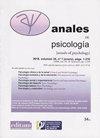Emotional intelligence and adult attachment: effects on problematic smartphone usage
IF 1.4
4区 心理学
Q3 PSYCHOLOGY
引用次数: 4
Abstract
Smartphone usage can become problematic when individuals have difficulties in emotional regulation. To clarify risk factors for problematic smartphone usage, the study had three objectives: To analyze the effect of emotional intelligence and attachment dimensions on smartphone usage; to evaluate differences by types and styles of attachment in problematic smartphone usage; to explore the roles of sex and age. For this purpose, the Smartphone Dependency and Addiction Scale, the Wong & Law Emotional Intelligence Scale, and the Adult Attachment Questionnaire were used. The study included 552 young adults (M = 21.79, SD = 2.66; 74.1% women) selected by purposive sampling, and classified in Generation Z and Millennials. The results showed that low awareness of one's emotions (emotional intelligence), poor self-esteem and need for approval, hostile conflict resolution, rancor, and possessiveness (attachment) predicted problematic smartphone usage. Furthermore, insecure type of attachment and negative styles such as fearfulness were closely related to smartphone addiction. Sex had some explanatory power with respect to device use, with women showing higher levels of problematic smartphone usage. In conclusion, the findings support the importance of the secure and positive attachment system, and being able to evaluate and regulate one’s own emotions for preventing problematic smartphone use. El uso del smartphone puede tornarse problemático cuando se presentan dificultades de regulación emocional. En la investigación se plantearon tres objetivos: analizar el efecto de las dimensiones de inteligencia emocional y el apego sobre el uso del smartphone; evaluar las diferencias en el uso problemático del móvil atendiendo a tipos y estilos de apego; explorar el efecto del sexo y la edad. Se utilizaron la Escala de Dependencia y Adicción al Smartphone, la Escala de Inteligencia Emocional de Wong & Law y el Cuestionario de Apego adulto. El estudio incluyó a 552 jóvenes (M = 21.79, SD = 2.66; 74.1% mujeres) seleccionados por muestreo intencional y clasificados en Generación Z y Millennials. Una baja conciencia de las propias emociones (inteligencia emocional), una pobre autoestima y necesidad de aprobación, la resolución hostil de conflictos, rencor y posesividad (apego) predecían el uso problemático. Además, el tipo inseguro de apego y los estilos negativos como el temeroso se relacionan más con este uso problemático. El sexo aportaba cierta capacidad explicativa, siendo las mujeres las que mostraron más problemas. Los hallazgos apoyan la relevancia de construir un apego seguro y positivo y de ser capaces de evaluar las propias emociones para prevenir los usos problemáticos del smartphone.情商和成人依恋:对智能手机使用问题的影响
当个人在情绪调节方面遇到困难时,智能手机的使用可能会变得有问题。为了澄清问题智能手机使用的风险因素,该研究有三个目标:分析情感智力和附件维度对智能手机使用的影响;按有问题的智能手机使用中的附件类型和风格评估差异;探索性别和年龄的作用。为此,使用了智能手机依赖和成瘾量表、Wong&Law情感智力量表和成人附件问卷。这项研究包括552名年轻成年人(M=21.79,SD=2.66;74.1%的女性)通过目的性抽样选择,分为Z代和千禧一代。结果表明,对一个人的情绪(情绪智力)、自我感觉差和需要批准、敌对冲突解决、怨恨和拥有(附件)的认识不足预测了有问题的智能手机使用。此外,不安全的依恋类型和恐惧等负面风格与智能手机成瘾密切相关。性在设备使用方面有一些解释力,女性的智能手机使用问题程度更高。总之,调查结果支持安全和积极的附件系统的重要性,并能够评估和调节自己的情绪,以防止出现问题的智能手机使用。当出现情绪调节困难时,使用智能手机可能会变得有问题。研究提出了三个目标:分析情绪智力和依恋维度对智能手机使用的影响;根据依恋类型和风格评估问题手机使用的差异;探讨性别和年龄的影响。使用智能手机依赖和成瘾量表、黄律师情绪智力量表和成人依恋问卷。这项研究包括552名年轻人(M=21.79,SD=2.66;74.1%的女性)通过故意抽样选出,并分为Z代和千禧一代。对自己情绪(情绪智力)的认识较低,自尊和对认可的需要较差,对冲突、怨恨和占有欲(依恋)的敌意解决可以预测有问题的使用。此外,不安全的依恋类型和恐惧等负面风格更多地与这种有问题的使用有关。性别提供了一定的解释能力,女性表现出最大的问题。这些发现支持建立安全和积极的依恋以及能够评估自己的情绪以防止智能手机的问题使用的相关性。
本文章由计算机程序翻译,如有差异,请以英文原文为准。
求助全文
约1分钟内获得全文
求助全文
来源期刊

Anales De Psicologia
医学-心理学
CiteScore
3.30
自引率
5.90%
发文量
57
审稿时长
4-8 weeks
期刊介绍:
Anales de Psicologia / Annals of Psychology is a multidisciplinary journal of the various thematic areas of scientific psychology. It publishes original research articles and theoretical review in any of its basic, applied and methodological areas included within psychology.
Publishing, financing, marketing and distribution corresponds Editum: Editions of the University of Murcia (Spain). The organizational guidelines and editorial policies come from the Editorial Team (elected for four years by the Areas and / or Departments of Psychology at the University of Murcia) and the Editorial Board, composed of scholars and experts from different universities and institutions national and international. It is published in print (ISSN: 0212-9728) since 1984 and in Internet publishing (web) (ISSN: 1695-2294) since 2000. Available online full text in pdf from the vol. 1 1984.
Anales de Psicologia / Annals of Psychology maintains a system of exchange with other journals and publications of psychology in the world. Through an free exchange agreement with their respective publishers or entities responsible for editing, these journals and publications are received at the University of Murcia (Biblioteca "Luis Vives", near the Faculty of Psychology) and in return, our journal is sent to libraries and educational and research institutions such centers responsible for editing.
 求助内容:
求助内容: 应助结果提醒方式:
应助结果提醒方式:


